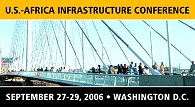2006年VOA标准英语-Conference Seeks Increased US Investment in Afr
搜索关注在线英语听力室公众号:tingroom,领取免费英语资料大礼包。
(单词翻译)
By William Eagle
Washington
27 September 2006
A first of its kind conference meant to outline the challenges and potential of investing in areas that will lead to economic growth in Africa is being held near Washington this week. American investors1 and African businessmen and government officials are discussing water, energy, transportation and communications technology. VOA reporter William Eagle reports from Washington on the U.S.-Africa Infrastructure2 Conference.
-------
 |
||
It is organized by the Washington-based Corporate3 Council on Africa, and among the many sponsors are General Electric and the U.S. Department of Transportation.
Stephen Hayes is the president of the Corporate Council on Africa, the CCA. He says Africa offers many opportunities for U.S. investors, and the conference will bring people together to capitalize on those opportunities.
"Road systems are very much available for American companies; most countries with major ports are building and expanding [them]; airports have got to be built and expanded," he said. "Infrastructure [also] includes telecommunications, optics and fiber4 optics, and computer networks. So a lot of things are available. It is a matter of trying to find out who the right contacts are and how to develop those relationships."
Hayes says he is concerned that American investments in Africa, with the exception of the energy sector5, are lagging behind investments from China, India and Europe.
One of the problems, he says, is that while the United States has the expertise6 to help develop African agribusinesses, telecommunications, and roads, railways and ports, many American investors are not familiar with Africa's financial environment. For that reason, the CCA invited U.S. government officials and representatives of international lending institutions who can lend support to U.S.-African partnerships8.
Among those scheduled to attend are representatives of the Department of Commerce, the Overseas Private Investment Corporation (OPIC), the United Bank for Africa, and NEPAD, the New Partnership7 for Africa's Development.
A scheduled speaker is the Transportation Department deputy assistant secretary for aviation and international affairs, Susan McDermott, who says she will emphasize U.S. support for strengthening Africa's infrastructure.
In an interview with VOA before the conference, she explained how improvements in the continent's transport system will affect Africa's trade with the United States.
"Today, Africa has some of the highest transportation costs in the world," she said. Some commentators9 have indicated that many of the tariff10 benefits of AGOA and other traditional advantages have been diminished, if not lost, because of the high cost of transporting goods to and from Africa. So improved transportation is going to play a critical role in strengthening, improving and sustaining U.S.- Africa trade flows."
Also participating in the first annual U.S.-Africa Infrastructure Conference is the law firm Hunton and Williams. It will help with workshops on the legal aspects of investment, including public-private partnerships, project finance, and contemporary business practices that encourage transparency.
The conference will also look at the importance of regionalism in African infrastructure projects.
Hunton and Williams partner Rob Edwards explains.
"While Africa as a continent is very large, it is broken into 54 countries, and in order to develop infrastructure on an economic scale, many [projects] will [need] to be done on a regional basis," he said. "For example, if you build a power plant in one particular country, it has to be anticipated that power would be [also be] exported to neighboring countries. If you are talking about roads, bridges and transportation, you need to connect up the economies of neighboring countries. So if Cote d'Ivoire has lots of cocoa, there has to be efficient way to get it to the coast and to foreign markets for sale."
The Department of Transportation's McDermott says the rapid globalization of commerce means that increased trade, and the potential wealth that comes with it, is no longer the province of developed nations. Interconnected markets now allow small and medium-sized businesses to become part of the world of buyers and sellers.




